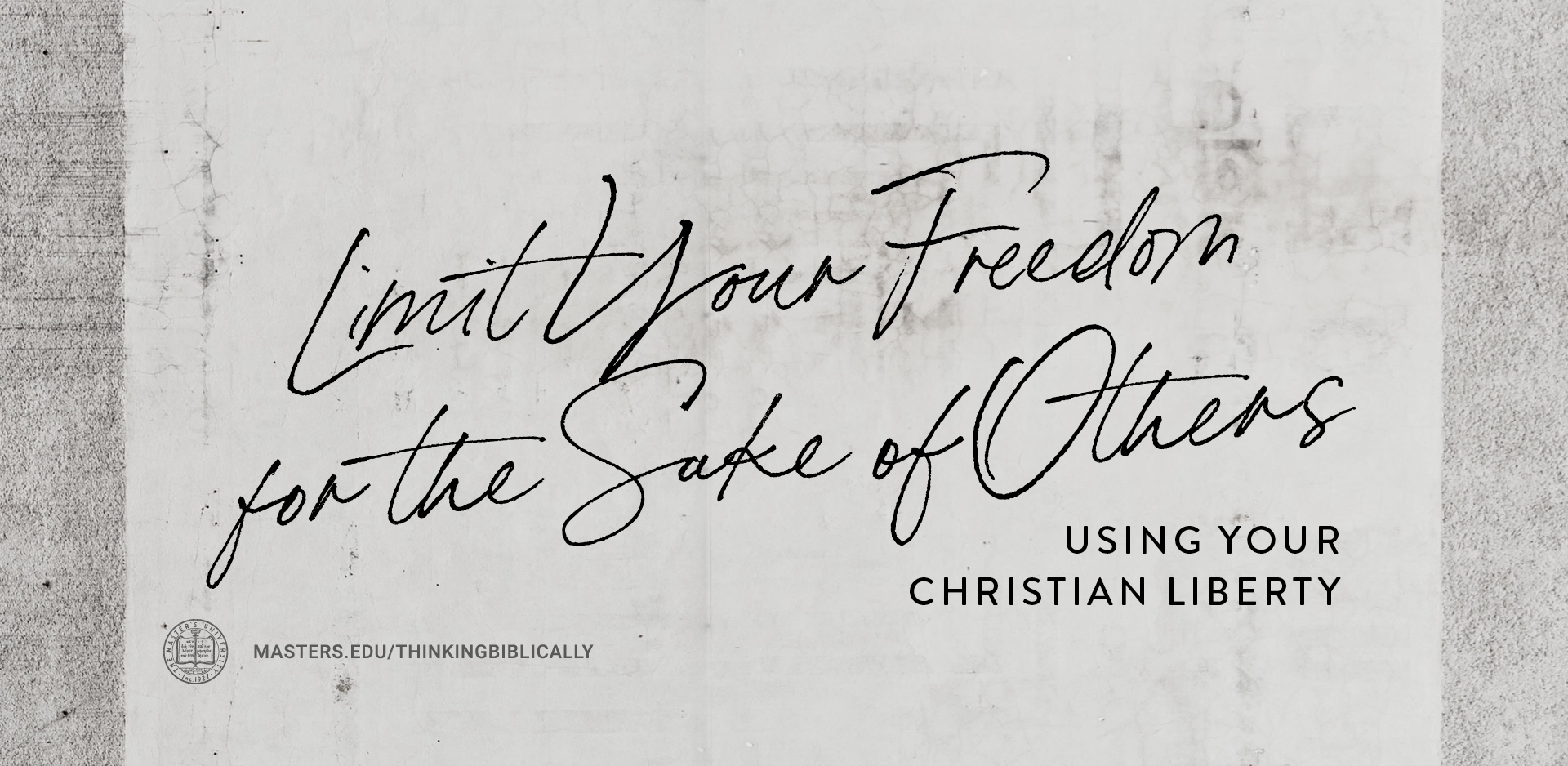
In the last post we looked at why it is necessary to abide by our consciences even when they are stricter than the freedoms that Scripture offers us. Today, we will examine why people with strong, biblically-shaped consciences should still sometimes limit their freedoms—not for their own sake, but for the sake of others.
But take care that this liberty of yours does not somehow become a stumbling block to the weak. For if someone sees you, who have knowledge, dining in an idol’s temple, will not his conscience, if he is weak, be strengthened to eat things sacrificed to idols?
For through your knowledge he who is weak is ruined, the brother for whose sake Christ died. And so, by sinning against the brethren and wounding their conscience when it is weak, you sin against Christ.
Therefore, if food causes my brother to stumble, I will never eat meat again, so that I will not cause my brother to stumble. (1 Corinthians 8:9-13)
Was it wrong for a first-century believer to eat meat sacrificed to idols? Not at all! Paul said as much earlier in his letter (1 Corinthians 8:4). Idols had no power, so sacrificing meat to it did nothing to change the meat. But even still, some early Christians who had been saved out of idolatry had sensitive consciences about this meat. They didn’t feel free to eat it. And Paul says that if you are with a believer who has a stricter conscience, you limit your freedom for their sake. If you are doing something in a group and someone says, “I don’t think I should do that,” then you should honor that person completely in his or her conviction.
Part of spiritual maturity is being free to limit your freedom for the sake of others. It is maturity to be so concerned about setting an example for others that you restrict yourself in order to avoid making them stumble.
That’s the reason I don’t drink alcohol, for example. It’s wrong to be drunk, but it isn’t wrong to drink alcohol—but even though I have freedom to drink in moderation, I have chosen not to. Why? Because if I did, someone would say, “Well, John MacArthur drinks, so it must be fine,” and they might go on to get drunk. Their sin wouldn’t be my fault, but I still don’t want to be the excuse that causes someone to stumble into sin.
Paul puts it this way:
We who are strong ought to bear the weaknesses of those without strength and not just please ourselves. Each of us is to please his neighbor for his good, to his edification. (Romans 15:1)
In other words, we should always aim to do whatever will be most beneficial to the people watching our lives. This will not only benefit other believers, but it will also serve as a compelling witness to unbelievers. As Paul says earlier in Romans,
Do not let what is for you a good thing be spoken of as evil. For the Kingdom of God is not eating and drinking but righteousness, peace, and joy in the Holy Spirit. He who in this way serves Christ is acceptable to God and approved by men. (Romans 14:16)
When you live the kind of life that never abuses freedom, this often makes you (and by extension, the gospel) noteworthy in the sight of non-Christians. On the other hand, if you call yourself a Christian while living on the edge of your freedoms, then your life will look much more similar to those of the people you are trying to reach. And why should they take notice of that?
The restrictions of our spiritual lives show people in a visual way the distinctiveness of the work of Christ in our hearts. And if our lives are going to be approved—if they are going to be tested by the people who watch us and proved after such examination—then we have to live lives that are far from the edge. We need to pull back into the zone where we are manifestly different than our culture.

The Master’s University and Seminary admit students of any race, color, national and ethnic origin to all the rights, privileges, programs, and activities generally accorded or made available to students at the school. It does not discriminate on the basis of race, color, national and ethnic origin in the administration of its educational policies, admissions policies, scholarship and loan programs, and athletic and other school-administered programs.
21726 Placerita Canyon Road
Santa Clarita, CA 91321
1-800-568-6248
© 2025 The Master’s University Privacy Policy Copyright Info
| Cookie | Duration | Description |
|---|---|---|
| cookielawinfo-checkbox-analytics | 11 months | This cookie is set by GDPR Cookie Consent plugin. The cookie is used to store the user consent for the cookies in the category "Analytics". |
| cookielawinfo-checkbox-functional | 11 months | The cookie is set by GDPR cookie consent to record the user consent for the cookies in the category "Functional". |
| cookielawinfo-checkbox-necessary | 11 months | This cookie is set by GDPR Cookie Consent plugin. The cookies is used to store the user consent for the cookies in the category "Necessary". |
| cookielawinfo-checkbox-others | 11 months | This cookie is set by GDPR Cookie Consent plugin. The cookie is used to store the user consent for the cookies in the category "Other. |
| cookielawinfo-checkbox-performance | 11 months | This cookie is set by GDPR Cookie Consent plugin. The cookie is used to store the user consent for the cookies in the category "Performance". |
| viewed_cookie_policy | 11 months | The cookie is set by the GDPR Cookie Consent plugin and is used to store whether or not user has consented to the use of cookies. It does not store any personal data. |
Notifications